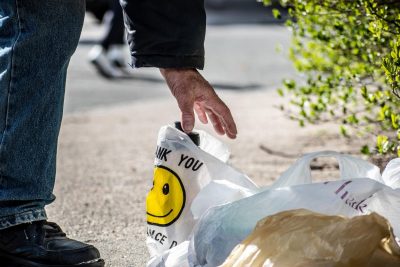One year in, the COVID-19 pandemic continues to leave many Boston residents facing food insecurity. Local nonprofits, like Building Audacity, have since been distributing groceries to families in need.

Massachusetts saw the largest increase in food insecurity from 2018 to 2020 in the country, according to an October study by Feeding America.
“A lot of folks don’t realize how many folks were hungry before the pandemic,” said Nakia Navarro, founder of Building Audacity. “Now that the pandemic has hit, people are scratching their heads because it’s people that they didn’t think were living check-to-check.”
Unemployment in Boston hit record highs since the start of the pandemic and remains high today — compared to previous years — coinciding with more families struggling to eat, wrote Erin McAleer, CEO of Project Bread, in a statement to The Daily Free Press.
In June of last year, 90,609 Boston residents received food stamps via the Supplemental Nutrition Assistance Program — up more than 20% from 75,355 residents that February, according to data from the Massachusetts Department of Transitional Assistance. Data for April and May was unavailable.
“We are in the midst of a hunger crisis unlike any other in our lifetime,” McAleer wrote.
Catalina López-Ospina, director of the Mayor’s Office of Food Access, wrote in a statement that food insecurity in Boston most heavily impacted already vulnerable communities.
A fall 2020 report by Project Bread — a Massachusetts hunger advocacy group — found that one in three Black and Latino households in East Boston are facing food insecurity, which is double that of white households.
Disparities in food insecurity, López-Ospina added, make tailoring assistance programs essential to the specific needs of individual households.
“This is why ensuring access to culturally appropriate and nutritious food is a critical part of our equitable response and recovery from the pandemic,” López-Ospina wrote. “We will continue to create and strengthen a resilient network of food access for all Bostonians who need a helping hand.”
Navarro said hunger advocacy work has been “a very white space” for the past 20 years. Her organization, she said, is trying to find equitable solutions — “allowing the last and least heard actually to lead the conversation.”
For example, she said families who are facing food insecurity asked for more fresh produce and snacks for children, as more kids are learning from home — the local youth leadership nonprofit Building Audacity responded as part of a larger COVID-19 relief effort.
“What we have been trying to do is give the most marginalized the best,” Navarro said. “We started doing our very best to find healthy, culturally appropriate food items for our folks, and that’s what we’re doing.”
School-aged children are greatly impacted by the pandemic, said Amanda Trombley, marketing manager at Food For Free. She said one in 11 Massachusetts children experienced food insecurity prior to the pandemic — but now it’s one in five.
“A lot of the places where they normally get food were closed until fairly recently,” Trombley said. “Up until April 1, there were still a significant number of schools that were operating remotely, or at least partially remotely, throughout the state, and that just cut down on access to school lunches.”
Seniors who are food-insecure are another group hit hard by the pandemic, Trombley said. Official statistics may not reflect this because some elderly people feel a social stigma around requesting assistance, according to the Mayor’s Office of Food Access.
“These are people who have some kind of health condition that makes it more challenging for them to get to a food pantry,” they said. “Then once the pandemic hit and food pantries were closed, it became even more challenging.”
Food for Free is a Cambridge nonprofit that rescues food destined to become waste and distributes it to food programs and individuals. To combat the closure of food banks and protect immunocompromised populations, Food For Free adjusted its food distribution to a boxed program.
“This is the preferred way of distributing food during the pandemic,” Trombley said, “because it limits the number of people actually touching the food and actually makes the handoff to the participants super simple.”
For some nonprofits, including Building Audacity and Food For Free, monetary donations can be useful for buying fresh groceries and grocery store gift cards for the people they serve, Trombley said.
But Navarro said tackling hunger takes more than just donations.
“We need to grow more in the city of Boston,” Navarro said. “I can’t even explain to you how powerful it would be if we started doing more hydroponics, more aquaponics … We have to start self-sustaining.”
Navarro said she’s witnessed an outpouring of support from volunteers, most of whom are ages 18-22.
However, there is still an extreme need for food — Trombley said Food For Free distributed 4.7 million pounds of food in 2020, compared to 2.2 million pounds of food in 2019.
“It’s been really hard on all the organizations involved because it’s been a continually changing problem,” she said. “We wish that we could be distributing even more food because we know there’s a need out there.”





















































































































